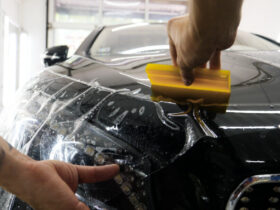Companies are constantly seeking innovative ways to promote their brand and increase visibility. One such method is commercial vehicle wrapping, which involves applying a vinyl wrap to a vehicle’s exterior to display advertisements, company logos, or promotional messages. While vehicle wraps offer an effective and eye-catching marketing solution, businesses must be aware of several legal considerations to ensure compliance with regulations and avoid potential disputes.
1. Vehicle Modification Regulations
One of the primary legal considerations for houston commercial vehicle wrapping is compliance with local and national vehicle modification regulations. Different jurisdictions have specific rules governing how vehicles can be altered or modified, including the addition of wraps. It’s essential to check with local authorities or the Department of Motor Vehicles (DMV) to ensure that the wrap does not violate any regulations related to vehicle appearance or safety standards.
2. Advertising and Trademark Laws
The houston commercial vehicle wrapping often features brand logos, trademarks, and other proprietary content. Businesses must ensure that their wrap designs do not infringe on the intellectual property rights of others. This includes obtaining the necessary permissions or licenses if using copyrighted images or trademarks. Additionally, businesses should be cautious about misleading or deceptive advertising practices, as these can lead to legal issues or disputes with competitors.
3. Insurance Considerations
Vehicle wraps can impact insurance coverage. It’s advisable to inform your insurance provider about the wrap to ensure that it is covered under your commercial auto insurance policy. Some insurance companies may have specific requirements or exclusions related to vehicle wraps, so it’s crucial to review your policy and discuss any potential adjustments with your insurer. This will help protect your investment in the wrap and ensure that you are adequately covered in case of damage or loss.
4. Contractual Agreements
When working with a vehicle wrap provider, it’s important to have a clear and detailed contract that outlines the scope of work, costs, and responsibilities. This contract should address the quality of materials used, the installation process, and any warranties or guarantees provided by the wrap installer. Having a well-drafted contract can help prevent disputes and ensure that both parties are on the same page regarding the project.
5. Maintenance and Removal
Businesses should consider the legal implications of maintaining and eventually removing the wrap. Regular maintenance is necessary to keep the wrap in good condition and avoid any potential damage to the vehicle’s surface. When it’s time to remove the wrap, it’s important to do so carefully to avoid damaging the vehicle. Some jurisdictions may have regulations regarding the removal process, so it’s wise to consult with professionals who can ensure compliance and proper removal techniques.










